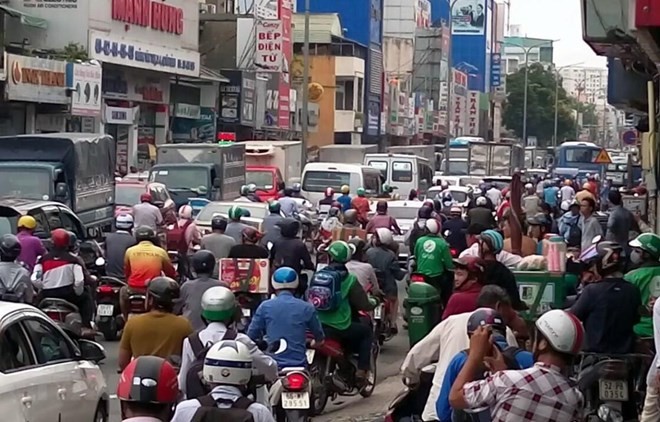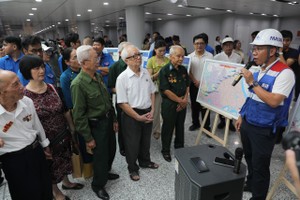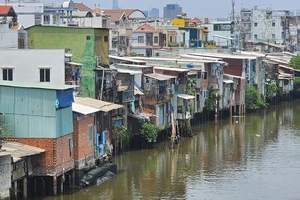
At a recent meeting, the consulting council for HCM City urban transport gathered feedback and reached a consensus to support the project, saying that only vehicles entering the downtown area should be charged.
If the project is approved, the Saigon River Tunnel Management Centre will develop the project.
The project, which will be carried out in the 2019-2021 period, would include 34 toll booths in districts 1 and 3 and in areas bordering districts 5 and 10.
The locations of the toll booth would form a 'ring' in the city centre and would include streets Hoang Sa, Nguyen Phuc Nguyen, Cach Mang Thang 8, Ba Thang Hai, Le Hong Phong, Ly Thai To, Nguyen Van Cu, Vo Van Kiet and Ton Duc Thang.
The booths will only collect fees from cars entering the city centre. Each car will be equipped with an automatic toll collection chip provided by the VETC electronic toll collection company at the toll booths.
Toll fares will be automatically deducted from the vehicle owner's account.
The fees will range from 40,000 VND (1.72 USD) to 60,000 VND (2.57 USD) during peak hours from 6am to 9am and 4pm to 7pm.
Ambulances, police cars, fire trucks and public buses entering the area will not be charged. Taxis and registered cars will pay 75 percent of the fee.
The booths will use Radio Frequency Identification technologies combined with an automatic number plate recognition to identify the number of vehicles entering the city centre.
These technologies help the toll booths ensure non-stop multi-lane toll collections with a capacity of 1,800 cars per hour on one lane.
The project is expected to reduce the number of private autos entering the centre by 49 percent in the first year, while the demand for public transport is predicted to rise by 9 to 15 percent.
If the project is approved, the Saigon River Tunnel Management Centre will develop the project.
The project, which will be carried out in the 2019-2021 period, would include 34 toll booths in districts 1 and 3 and in areas bordering districts 5 and 10.
The locations of the toll booth would form a 'ring' in the city centre and would include streets Hoang Sa, Nguyen Phuc Nguyen, Cach Mang Thang 8, Ba Thang Hai, Le Hong Phong, Ly Thai To, Nguyen Van Cu, Vo Van Kiet and Ton Duc Thang.
The booths will only collect fees from cars entering the city centre. Each car will be equipped with an automatic toll collection chip provided by the VETC electronic toll collection company at the toll booths.
Toll fares will be automatically deducted from the vehicle owner's account.
The fees will range from 40,000 VND (1.72 USD) to 60,000 VND (2.57 USD) during peak hours from 6am to 9am and 4pm to 7pm.
Ambulances, police cars, fire trucks and public buses entering the area will not be charged. Taxis and registered cars will pay 75 percent of the fee.
The booths will use Radio Frequency Identification technologies combined with an automatic number plate recognition to identify the number of vehicles entering the city centre.
These technologies help the toll booths ensure non-stop multi-lane toll collections with a capacity of 1,800 cars per hour on one lane.
The project is expected to reduce the number of private autos entering the centre by 49 percent in the first year, while the demand for public transport is predicted to rise by 9 to 15 percent.
























